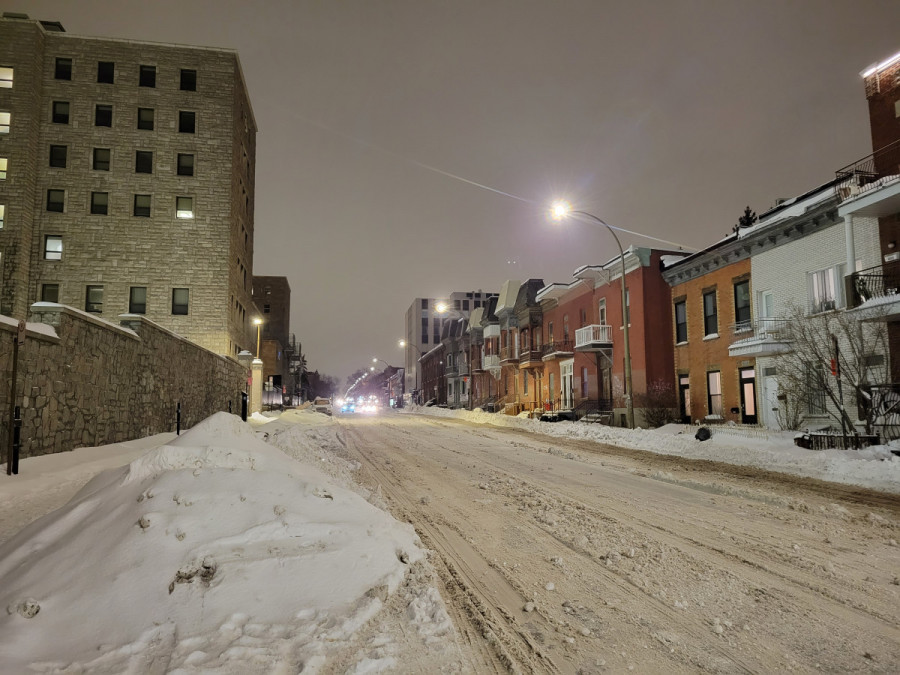Sex workers: Neglected victims of the pandemic
Sex Work Autonomous Committee calls for the decriminalisation of sex work
The Sex Work Autonomous Committee, a sex work activism organisation, is calling for the decriminalization of their industry to protect their workers from the effects of the pandemic and the harm they face regularly as stigmatized workers.
Since they started organising at the beginning of the pandemic, decriminalizing sex work has been at the forefront of SWAC’s demands because it would allow more freedom and protection to do their work safely.
Melina, a sex worker with SWAC, said the demands would allow them access to protection from the Commission des normes, de l'équité, de la santé et de la sécurité du travail. She also said that during the pandemic, it would have allowed sanitary assistance from the government access to emergency financial assistance.
“For a lot of sex workers, [sex work] is a means of survival,” Melina said.
The pandemic resulted in a huge loss of income for Melina. She went from having five or six clients per week to having only one. Like many others, she adapted by doing more work online but is still not making as much money as she did before.
Unlike most Canadians, sex workers were not eligible for emergency financial assistance such as the Canada Emergency Recovery Benefit because they could not declare their income to the government.
According to Coco, a sex worker with SWAC who wished to remain anonymous, there are many measures the government can take now to protect them from infection. Prioritizing sex workers for vaccinations, providing rapid tests, and allowing massage parlours to require vaccination passports are a few examples. However, sex work would have to be decriminalized for them to qualify for these protective measures.
Sex workers have been calling for the decriminalization of the sex industry for a long time. The federal government introduced its latest legal reform regarding sex work, the Protection of Communities and Exploited Persons Act, in 2014. The aim of this legislation was to penalize those who purchase sexual services rather than those who sell them.
Read Also: Censorship and sex work: The realities of the modern-day sex worker
“For a lot of sex workers, [sex work] is a means of survival,” — Melina
However, Concordia sociology and anthropology professor Francine Tremblay argues that this legislation fails to remove sex workers from harm’s way. Rather, this has been an issue long before the pandemic started.
Tremblay says the federal government betrayed sex workers by neglecting them in their pandemic strategic plan. Because of this, as bars and clubs closed, many sex workers were forced to continue working, risking their safety and that of the people they were in contact with.
“I blame the government directly for not taking care of all women’s safety and making sure that they were in a safe environment,” she added.
According to Melina, not only did they not receive financial or help with enforcing health protocols from the government, but they were subjected to increased scrutiny by the police.
Measures like the curfew only made life more difficult. Sex workers in many countries all over the world, such as India, Kenya, and Bolivia, have been suffering the negative effects of government-imposed curfews. Cultural and societal differences have determined their various impacts but, ultimately, the story is the same: curfews decrease the demand for sex workers, who mainly operate at night, leaving them to scramble for alternatives to survive.
“Curfews are not effective. They just expose us to more violence from the police, at work, and in life in general,” said Coco.
Even though the curfew was lifted on Jan. 17, sex workers are still facing numerous challenges because of pandemic restrictions. The stigmatization of the industry has influenced how they are treated by authority figures and the public in general.
“I know people think we should stop working [to protect ourselves], but that is not how it works. The pandemic is difficult for sex workers because we are really isolated,” said Melina. “We also hold the weight of contaminating our friends, partners, and our families so we always need to reconfigure our bubbles.”
Melina said sex workers essentially had to figure out how to protect themselves on their own. To do so, they consulted other sex workers and discussed what worked best.
For many, their work environment was not supportive of them following health measures. Melina and Coco said in some places, sex workers who wanted to wear masks while working were prohibited from doing so, under the threat of losing their jobs.
Melina and Coco said their bosses were able to force them to do things they didn’t want to do because they knew there were many girls who would have been willing to take their place. This mentality allows bosses to exploit them in many ways, like demanding they get a portion of the pay sex workers receive.
“Curfews are not effective. They just expose us to more violence from the police, at work, and in life in general,” — Coco
Even if sex workers were to stop working, there are little to no alternatives for them once they leave the industry because they cannot count sex work as professional experience.
“Right now I am helping a former sex worker who was convinced by someone to leave the industry. [Currently], she is so poor that I have to pay for her cigarettes,” said Tremblay. “She’s not the only one. There is nothing for [many who] decide to leave.”
For Coco, destigmatization is key to improving sex workers’ social mobility. This can be done by educating everyone, including kids, about all aspects of sex, like porn, consent and sexually transmitted diseases. She also said people need to learn about how heteronormativity affects political life since it influences which sex work policies are passed.
“Talk about it, read books written by sex workers, and get educated about sex workers even if you are not a sex worker because everything is connected,” Coco said. “If we are not free, then nobody is free.”




1_600_375_90_s_c1.jpg)


